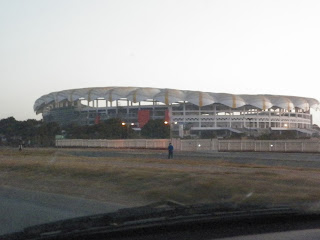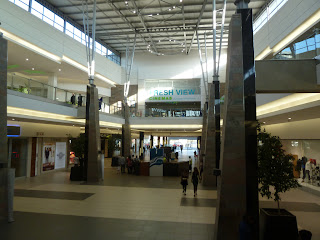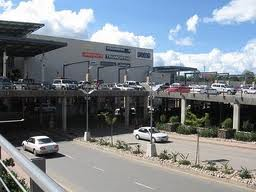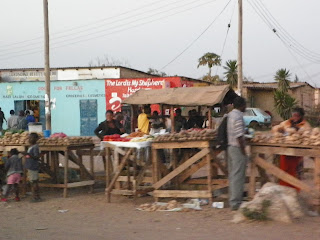I recently returned from a visit to Zambia and was struck by the speed with which the Africa Rising phenomenon is becoming evident there.
For readers who aren't aware of what I mean with the term "Africa Rising", I am speaking of the growing belief that the coming decades will see accelerating progress in combatting development challenges in Africa, and that economic growth will lead to the emergence of a middle class and major reductions in poverty. Those who hold this belief cite such statistics as the following:
- decline in rate of malaria deaths by 30% in many of the worst affected countries
- rate of new HIV infections dropping by up to 74%
- increasing literacy rates
- improving stats on infant and maternal mortality rates
- increased political stability and growth in democratic systems
- massive increases in real income
- sustained GDP growth of well over 5% in most countries
- exponential increase in foreign direct investment
Of course, massive poverty still exists and there are many cases of entrenched conflict (e.g. DR Congo), corruption, and neo-colonialist resource stripping by foreign companies. The evidence of improvements, however, has been noticed by many and reported in popular press to the point that old stereotypes are rapidly fading.
Just over ten years ago, the Economist magazine published a cover story on Africa entitled "The hopeless continent".

A decade later, they were big enough to admit that the picture had changed substantially, and the continent was indeed finding reason for hope and optimism. The cover story a couple of years ago was entitled "Africa rising".

Many others have piled on in the press in their rush to voice agreement, including Time magazine, The New York Times, and The Times.
An excellent book has also been written on this topic and with the title: "Africa Rising: How 900 million African consumers offer more than you think" by Vijay Mahajan.

Mahajan breaks down this phenomenon in very readable terms and then goes on to outline how businesses can take advantage of the massive opportunities that will come from not just the rising middle class in Africa, but also the mass of people at the bottom of the economic pyramid who are also making economic progress and who collectively represent a massive amount of potential purchasing power for consumer goods and services.
So, on my visit to Zambia I was very curious to see if there was any evidence of this progress and to see what the environment felt like.
Soccer Stadiums
Soccer (football) is the most popular sport across Africa. The stereotypical image of African football is a bunch of shoeless boys playing on a dusty field with rusty colonial-era goalposts and a ball made of twine and some wadded-up rubbish. Although I did see a couple of those fields in the rural areas, I was quite impressed with the following two stadiums. When the big game is on, these two beautiful stadiums full up with locals who have a few Kwacha to spare for admission.
Levy Mwanawasa Stadium in Ndola (Copperbelt):
And the Gabon Disaster Heroes National Stadium in Lusaka:
Shopping Malls & Strip Malls
In the last couple of years South African commercial real estate developers showed up in a partnership with some of the rapidly-expanding South African power retailers and have built several shopping malls in Zambia's major cities. There are four in the capital Lusaka, and I also visited a beauty in Ndola, and several more are in the planning stages.
One of the largest is the Manda Hill shopping centre in Lusaka. Walking through there was a sort of weird time warp back to my couple of years that I was in Cape Town. It was also interesting to note that there were many local Zambian entrepreneurs that had set up shop in Manda Hill as well. The parking areas were very busy, and the mall had a lot of people in it. One thing I took note of was that I didn't see a single other white person for the first five minutes until I saw a safari tour operator in the bank's waiting area. Not an expat to be seen - all the shoppers were part of the Africa One and Africa Two market segments that Mahajan writes about in his book. And they were spending real money and generating more economic activity, employment, and tax revenue for the government.
Manda Hill interior:
Manda Hill exterior:
I don't want to be accused of only showing one side, so here is a more typical shopping experience that most Zambians still make use of. In Manda Hill you can go to the Spur restaurant or Nando's, but a lot more Zambians go for a drink or bite to eat after work at a place like this roadside pub with the refreshingly honest name: "The Easy Come Easy Go Roadside Pub".
And to pick up the groceries, they might more likely pick up some vegetables at a stand like this in an informal market, and perhaps also buy a few things for the house at a shop like the "The Lord is my Shepherd Hardware Shop". More and more, however, will buy such necessities at a shop like the South African owned Shop-Rite in a commercial shopping centre.
Homes
I spent a few nights in the homes of middle-class Zambians. Things are fairly simple inside, but they are gradually adding new appliances, upgraded (functioning?!) toilets, and even artistic decorations for the walls. Repainting the home to more modern or preferred colours? Probably almost unheard of a couple of decades ago, but now the Builder's Paradise shops seem to be thriving in service of such growing consumer preferences.
All around the major cities I saw evidence of new construction such as these small but sturdy homes, probably destined to be owned by semi-skilled workers in the Africa Two category.
Most Zambians, however, live in rural villages and in homes that look something like this. Many do not yet have access to clean water or toilets, but the government is beginning with efforts to push such services out into rural areas and to upgrade slums outside the big cities. I saw many shiny new water wells while on my way through the country.
Here's another view of a rural setting, with some more typical homes along the road. This is the stretch where I saw the twine football match on the dusty pitch.
As the economy grows and these people move beyond subsistence agriculture, it is likely that more solid structures will arise here and more people will have access to proper water and sanitation. They will create jobs in construction and for municipal service workers as they build, thereby fueling more economic growth.
Church
While growing up in Canada, I often heard at church about mission projects in Africa and other developing regions where funds had to be raised to help people build a church building. Later, in my teen years, I heard of a lot of people including some of my friends who went on "Missions Trips" to go help build such a facility. Our family also gave donations to help support missionaries who would go and serve people overseas.
So, when I went to church at the Woodlands Baptist Church in Lusaka on Sunday morning, at some subconscious level I think I was half expecting to see a Baptist missionary from Arkansas USA and maybe a few white financial supporters in nice suits on an inspection visit. Well, apparently Africa is rising in the church just as well as in the economy. I was the only white person in the place. The Zambian pastor gave a rousing sermon on the practical power of the Holy Spirit, and after the service he gave the pulpit over to a member of the council to talk about the building project. A-ha! Now the American benefactors would be revealed?? But no, the announcement spoke of thanksgiving that the people of the congregation had already managed to raise 80% of the funds needed for their new and expanded building on the new piece of land that they had purchased for themselves.
My church visit also gave other evidence of economic growth - the parking lot was not filled with donkey carts, but rather Toyotas, Land Rovers, and Tatas.
Roads
While driving around the country, I couldn't help but notice the roads we were driving on. Here was a real land of extremes. This particular road was beautifully new, wide, and smooth, with deep drainage gutters on each side. Unfortunately after a couple of kilometres it abruptly ended and became a dirt road with massive potholes. I was told by one person that the entire crew pulled up stakes and relocated to a municipality that was about to have a byelection.
The main highway coming into Lusaka from the Copperbelt. Smooth, divided, with passing lanes. Just keep an eye out for the sudden/abrupt appearance of axle-snappingly large speed humps at police road checks in the middle of a 100km/h speed zone. Driver beware.
A closer look may be needed to see the depth of the ruts in the road surface. Look at the right side of the picture to see how much the road surface has settled - there is still a lot of progress to be made in Zambia.
Probably a fairly typical Zambian road scene, complete with random dead dog. Well, actually, most rural roads aren't anywhere near this smooth.
So, the road system in Zambia has a lot of extremes. On the Africa Rising side of things, however, it should also be noted that the President has recently announced over 8,000km of roads are currently in the planning stage and about to be built. If only half of that number materialize, it will have profound benefits to the efficiency with which commerce can be conducted.
People
The best evidence that Zambia is rising can from my conversations with all the people From Africa One and Africa Two that I met. These people and their families had poured everything into education both in their own country and overseas, and were now helping others to do the same. Most of them had at least one entrepreneurial venture in progress outside of their main employment, with four or five other ideas or opportunities in backup. Buying a franchise shop, building a few rental housing units, partnering with a couple of others to develop commercial space, etc. These were people who could probably have a good job in a developed country if they wanted it, but they love their country and believe in its future. They are putting their money where their hearts are.
In all my conversations with these Africa Rising entrepreneurs and domestic investors, they described one major challenge that is holding back their plans and the growth of the country. A lack of capital. A handful of fortunate souls can access the modest funds in government programmes, and the rest can only access finance companies that offer lending rates at 60%/month or higher.
Are there opportunities for foreigners with capital to do good business in Zambia while making a positive impact on the country's future?
Yes.
Do I believe that Africa is rising and that Zambia will be on the forefront of that wave of growth?
Absolutely yes.




















